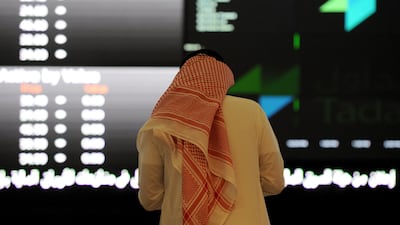Saudi stocks recovered after a disastrous opening on Tuesday as investors digested details of the government’s landmark budget.
On Monday, the budget set deep cuts in capital spending for next year and reduced utility subsidies in an effort to deal with shrinking oil revenues.
The benchmark Tadawul All Share Index in Riyadh sank by nearly 5 per cent before recouping most of the losses to end 0.8 per cent lower at 6,930.60.
Around the region there was a similarly mixed reaction.
Both the main indexes in Dubai and Abu Dhabi posted small gains, with the Dubai Financial Market General Index closing up 0.4 per cent at 3,134.82 and the Abu Dhabi Securities Exchange General Index rising 1 per cent at 4,296.16.
Meanwhile, Bahrain and Kuwait indexes lost ground.
The Saudi budget had been well flagged but the cuts in energy subsidies were more unexpected.
The Saudi government said it planned to cut spending next year by 20 billion riyals (Dh19.58bn) to 840bn riyals, which would bring the deficit down to 326bn riyals from 367bn riyals this year.
With a slowing economy that would still mean the deficit would rise to 16 per cent of GDP from 15 per cent this year, although it would remain well below the IMF’s forecast of a 21 per cent budget shortfall.
While individual companies are seen as likely losers from the budget, the actions taken are widely seen as necessary to deal with the 70 per cent plunge since last year in the price of oil, which directly accounts for more than 70 per cent of Saudi government revenue.
“Overall, it is positive for the economy,” Nishit Lakhotia, the head of research at Securities & Investment Company in Bahrain, said of the budget cuts. “It shows they are controlling expenditures and reducing subsidies – that is, they are doing the structural reforms that everyone has been recommending given the prospect that oil prices are not likely to return to the levels we’ve seen between 2010 and 2014.”
The “landmark budget” signifies a positive change of direction for the Saudi government, according to Jean-Michel Saliba, regional economist at Bank of America Merrill Lynch.
“It likely marks the end of material overspending practices,” Mr Saliba says. Also, “it starts to introduce a credible medium-term fiscal consolidation strategy to address the oil price slump through revenue and expenditure measures, the first round of which saw sweeping energy, water and electricity administered price changes”.
The budget also underscored the Saudi government’s commitment to its energy and foreign exchange policy, he said.
Forward riyal/US dollar contracts had been rising sharply for weeks, despite assurances in September from the Saudi central bank chief, Fahad Al Mubarak, that the kingdom would not abandon the three-decades-old riyal-dollar peg.
The pressure on the riyal could be a harbinger of inflation, among other worries for the Saudi Arabian economy
But having jumped 250 points early on Tuesday to reach an eight-year high of 725 points, the forward riyal/dollar contract fell back to 620 late in the day as the government’s commitment to policy regained some credibility with traders.
Among the biggest losers on the day was Saudi Basic Industries Corporation (Sabic), the country's dominant petrochemicals producer and one of the biggest in the world.
Sabic shares, which are the largest component in the Tadawul index at more than 7 per cent, ended down 4.5 per cent at 78.03 riyals.
Also posting losses was Saudi Electricity, down 5.7 per cent at 15.74 riyals, following a statement from the company making it clear that any gains it would make from the cut in energy subsidies would be offset by rising costs.
“It’s a double whammy for these companies,” said Mr Lakhotia.
“The petchem companies’ feedstock prices are definitely going up, also for gas-intensive industries. So, at one end they are having to face declining product prices at which they can sell, and at the other end their costs are going to increase. Profitability is going to get hit and there is more room for downside” in the share prices.
Big energy users, such as makers of cement, also reflect this squeeze. For example, Yanbu Cement was one of the day’s biggest losers, dropping 3.3 per cent to 43.74 riyals.
The budget squeeze had been largely factored into markets as the oil price slump set in.
The Tadawul has dropped from above 11,100 at the end of last year to a four-year low of 6,686.27 reached earlier this month.
amcauley@thenational.ae
Follow The National's Business section on Twitter

